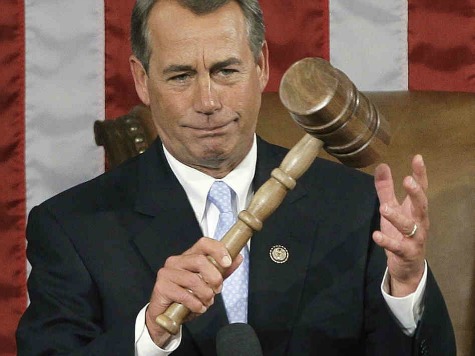
Throughout the “fiscal cliff” negotiations, Speaker Boehner promised that only legislation that had the support of a “majority of the majority” would come to the floor for a vote. It was his nod to reassure conservatives that he wouldn’t accept a terrible deal to avoid the tax hikes and automatic defense cuts triggered in the new year. As the details of the Senate-passed deal emerge, though, Boehner’s ability to keep that promise are in doubt.
The Senate deal de-couples the tax hikes from spending cuts. The bill raises taxes by $620 billion over the next decade by permanently raising tax rates on couples making more than $450,000 a year. There are almost no spending cuts in the deal. In fact, the spending cuts that were set to take effect starting tomorrow, the sequestration, have been delayed for at least two months.
Boehner and other members of House GOP Leadership have said from the beginning of talks that they would only accept higher taxes if significant spending cuts and some entitlement reform were on the table. They planted a flag around the principle that higher revenues were only acceptable if there were at least an equivalent amount of spending reductions. This deal, however, provides $41 in higher tax revenue for every $1 in spending cuts. That is very far from the “balanced” deal Boehner promised.
This afternoon, the House GOP caucus will meet behind closed doors to discuss the deal. Boehner will learn fairly quickly if he’ll be able to keep his promise to win the support of a majority of his caucus. He will need the support of at least 120 Republicans to deliver on his promise. If he holds this, he will then need votes from Democrats to approve the deal.
It is easy to imagine a large number of GOP members rejecting a deal that only addresses the tax side of the fiscal cliff. Leadership may try to argue that, since we’ve technically gone past the cliff, the deal doesn’t raise taxes, rather it lowers taxes for certain income groups. But, with almost no spending cuts as a consolation, that argument may not be effective.
Of course, Boehner could decide to go forward with a vote later today without his promised “majority of the majority” and rely on Democrats to pass the measure. At that point, however, he would lose claim to being the leader of the Republicans.
Rank and file members have given Boehner wide latitude in the fiscal cliff negotiations. He was given the benefit of the doubt, chiefly on his promise to win support of a majority of the caucus for any deal. GOP members may soon regret that decision.

COMMENTS
Please let us know if you're having issues with commenting.